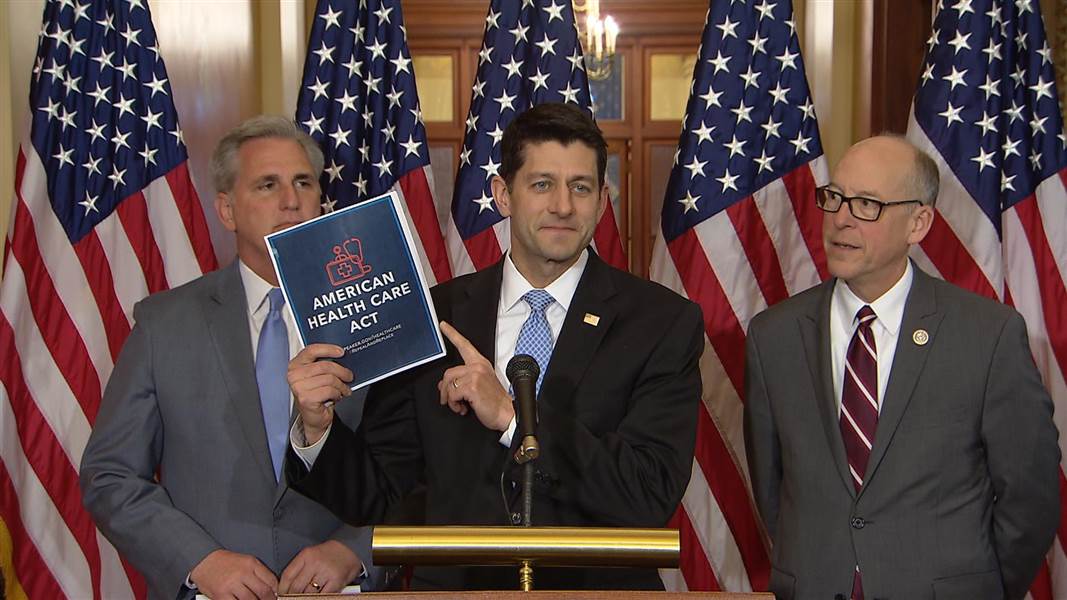How to avoid a healthcare disaster
The American Health Care Act of 2017 would have been a disaster for human health. A nonprofit health care group in Minnesota needed to articulate unequivocal opposition to the AHCA, while advancing a positive vision for good reform. This editorial, never published, attempted to do just that.

A bill now before the U.S. House of Representatives, called the American Health Care Act (AHCA), would not help health insurers serve Minnesotans better. The AHCA, as currently drafted, would increase the overall cost of health care for many people, make health insurance unaffordably costly for many — particularly those who need it most — and increase the financial burden on all Minnesotans to compensate for decreased federal health care funding.
We believe our representatives can and must do better.
In this we agree with many others who serve the health and wellbeing of Minnesotans, including the Minnesota Medical Association, the Minnesota Hospital Association, the Minnesota Department of Human Services, and lawmakers from both the DFL and the GOP.
As members of Congress learn more about the bill, it seems unlikely that the AHCA will become law in its current form. [Update: It didn’t.] Still, we know that other efforts at reform will soon follow. To help policymakers achieve meaningful health reform more effectively, it’s important to learn from the mistakes of the AHCA — mistakes that, fortunately, can easily be avoided.
Health reform should:
- Cut costs. The biggest problem in health care is that it’s simply too expensive. There is broad consensus — among experts across industries, sectors and political views, and the American people as a whole — that the reforms set forth in the AHCA would not make health care more affordable, in Minnesota or in the nation at large. Good health policy brings down the overall expense of health care.
- Encourage personal responsibility. In Minnesota, we are already seeing health people who buy health insurance on their own. By eliminating the existing requirement that everyone have insurance — the “individual mandate” pioneered in Massachusetts by Gov. Mitt Romney — the AHCA would discourage young and healthy people from buying health insurance. Coupled with a delay in other incentives to encourage coverage, this means fewer people will buy health insurance on their own and that those left are more likely to need care. With fewer people to help, expenses would rise dramatically for those of us who still had health insurance. Good health policy includes everybody.
- Help people who buy insurance on their own. About 250,000 Minnesotans don’t get health insurance through an employer or a government program, and they have seen their health insurance premiums soar in recent years. While the AHCA would make health insurance cheaper for younger and healthier people in this group, it would dramatically increase the expense for those who really need to buy their own insurance — farmers, early retirees, freelancers and contractors, and many many more. Good health policy doesn’t favor “young invincibles.”
- Make it easier to be healthy. We support policies that bring health care within reach for everyone in Minnesota. By cutting or eliminating health insurance for about 1.2 million Minnesotans, the AHCA would make it harder for one out of every five of us to stay well and get care. Good health policy tends toward health.
- Help us help each other. The AHCA would change the way the federal government helps people pay for health insurance through tax credits. According to the nonpartisan CBO, the new tax structure would make health insurance more expensive for many who need it most — particularly older and lower-income Minnesotans. Good health policy looks out for the most vulnerable.
- Take advantage of federal support. By reducing the amount of federal funding for our state by billions of dollars every year, the AHCA would make health care more expensive for individual Minnesotan businesses, families and individuals — not least by raising taxes to compensate. Good health policy helps the states.
- Encourage Minnesota innovation. By capping the amount of Medicaid support states could receive from the federal government, the AHCA would penalize Minnesota for the cost savings we have already achieved through innovative ideas of our own. Good health policy rewards efficiency and quality.
The health care regulations we have now are far from perfect. Although more people have health insurance in America — and in Minnesota — than ever before, we still have far to go before everyone has stable access to excellent and affordable health care. Lawmakers in Washington and Saint Paul are trying to lower the expense of health insurance by creating new policies. In the process, they are debating the basic principles that structure how we get and pay for medical care.
Some of our political leaders think health care can only be better, cheaper and more accessible if government leaves individual consumers free to choose medical services in open markets. Others believe the government of a democratic nation has a duty to bring wellbeing within reach for all its people. A battle between these competing ideas about health, law and freedom is playing out before our eyes.
No one can foresee the outcome of today’s political battles. But we do know that all of us, no matter who we are or where we live, will feel their effects. On the behalf of our members, we urge state and national policymakers never to forget the human consequences of their choices. No matter our politics, we can agree that good health policy should advance the cause of human wellbeing.
A bill now before the U.S. House of Representatives, called the American Health Care Act (AHCA), would not help health insurers serve Minnesotans better. The AHCA, as currently drafted, would increase the overall cost of health care for many people, make health insurance unaffordably costly for many — particularly those who need it most — and increase the financial burden on all Minnesotans to compensate for decreased federal health care funding.
We believe our representatives can and must do better.
In this we agree with many others who serve the health and wellbeing of Minnesotans, including the Minnesota Medical Association, the Minnesota Hospital Association, the Minnesota Department of Human Services, and lawmakers from both the DFL and the GOP.
As members of Congress learn more about the bill, it seems unlikely that the AHCA will become law in its current form. [Update: It didn’t.] Still, we know that other efforts at reform will soon follow. To help policymakers achieve meaningful health reform more effectively, it’s important to learn from the mistakes of the AHCA — mistakes that, fortunately, can easily be avoided.
Health reform should:
- Cut costs. The biggest problem in health care is that it’s simply too expensive. There is broad consensus — among experts across industries, sectors and political views, and the American people as a whole — that the reforms set forth in the AHCA would not make health care more affordable, in Minnesota or in the nation at large. Good health policy brings down the overall expense of health care.
- Encourage personal responsibility. In Minnesota, we are already seeing health people who buy health insurance on their own. By eliminating the existing requirement that everyone have insurance — the “individual mandate” pioneered in Massachusetts by Gov. Mitt Romney — the AHCA would discourage young and healthy people from buying health insurance. Coupled with a delay in other incentives to encourage coverage, this means fewer people will buy health insurance on their own and that those left are more likely to need care. With fewer people to help, expenses would rise dramatically for those of us who still had health insurance. Good health policy includes everybody.
- Help people who buy insurance on their own. About 250,000 Minnesotans don’t get health insurance through an employer or a government program, and they have seen their health insurance premiums soar in recent years. While the AHCA would make health insurance cheaper for younger and healthier people in this group, it would dramatically increase the expense for those who really need to buy their own insurance — farmers, early retirees, freelancers and contractors, and many many more. Good health policy doesn’t favor “young invincibles.”
- Make it easier to be healthy. We support policies that bring health care within reach for everyone in Minnesota. By cutting or eliminating health insurance for about 1.2 million Minnesotans, the AHCA would make it harder for one out of every five of us to stay well and get care. Good health policy tends toward health.
- Help us help each other. The AHCA would change the way the federal government helps people pay for health insurance through tax credits. According to the nonpartisan CBO, the new tax structure would make health insurance more expensive for many who need it most — particularly older and lower-income Minnesotans. Good health policy looks out for the most vulnerable.
- Take advantage of federal support. By reducing the amount of federal funding for our state by billions of dollars every year, the AHCA would make health care more expensive for individual Minnesotan businesses, families and individuals — not least by raising taxes to compensate. Good health policy helps the states.
- Encourage Minnesota innovation. By capping the amount of Medicaid support states could receive from the federal government, the AHCA would penalize Minnesota for the cost savings we have already achieved through innovative ideas of our own. Good health policy rewards efficiency and quality.
The health care regulations we have now are far from perfect. Although more people have health insurance in America — and in Minnesota — than ever before, we still have far to go before everyone has stable access to excellent and affordable health care. Lawmakers in Washington and Saint Paul are trying to lower the expense of health insurance by creating new policies. In the process, they are debating the basic principles that structure how we get and pay for medical care.
Some of our political leaders think health care can only be better, cheaper and more accessible if government leaves individual consumers free to choose medical services in open markets. Others believe the government of a democratic nation has a duty to bring wellbeing within reach for all its people. A battle between these competing ideas about health, law and freedom is playing out before our eyes.
No one can foresee the outcome of today’s political battles. But we do know that all of us, no matter who we are or where we live, will feel their effects. On the behalf of our members, we urge state and national policymakers never to forget the human consequences of their choices. No matter our politics, we can agree that good health policy should advance the cause of human wellbeing.



